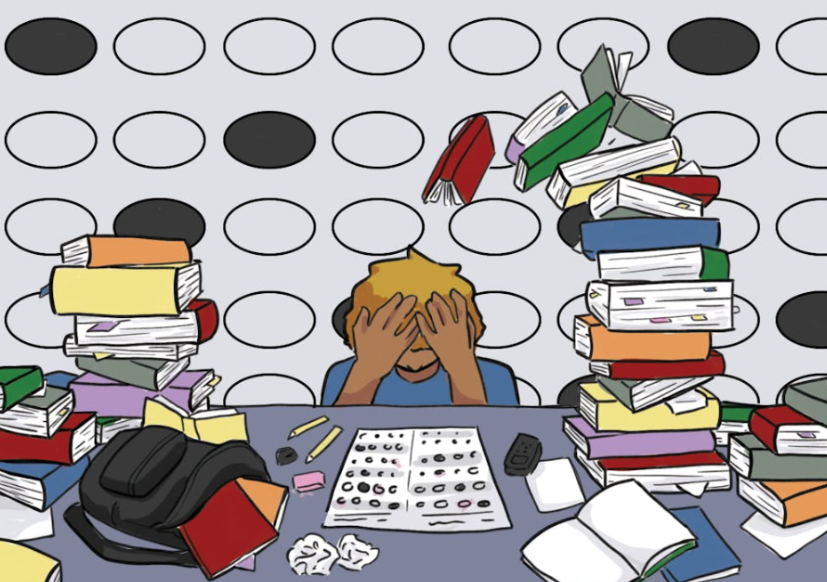Standardized testing: the age-old enemy of countless students. With colleges and universities seemingly only interested in this one number, it can feel like the course of your future is riding on this exhausting, three-hour, pain-staking test. So much stress is put on high school students as it is, but standardized testing adds a new depth of hair-pulling and nail-biting for many test takers each year. The legacy of standardized testing should soon reach its end as testing biases and uncontrollable factors have a greater influence on the scores students receive than these big corporations would like to admit.
After COVID-19, many institutions established a test-optional policy, meaning that, due to the implications of the pandemic, students could choose whether or not they wish to submit their test scores to the universities they are applying to. However, now, over four years since the peak of COVID-19, colleges around the nation have decided to begin enforcing test score submissions once again. Top universities such as Harvard, MIT, Brown, and Caltech have reinstated their testing policies. According to Harvard’s FAQ Website, “The decision to return to requiring testing was motivated by a number of important new insights, including research led by Harvard faculty members that confirms the role of standardized testing to help predict college and post-college success for students, including those from less-resourced backgrounds, particularly when considered together with other academic credentials”. This demonstrates that colleges are beginning to emphasize the importance of standardized testing more and more as time goes on. Now that the top universities in America are requiring test scores once again, other universities and colleges are likely to follow suit, putting even more pressure on rising seniors to get a perfect 1600 or 36 so that they can be admitted to the institution of their choice. With no data linked to back Harvard’s statement, one must question if the test scores are actually beneficial to determine success. With that being said, is a standardized test really the best way to determine intelligence?
The simple answer- no. But it is more complicated than that. To be more specific, countless students are inherently disadvantaged as they begin the college admissions process solely because of their test taking abilities. Test anxiety impacts numerous students, but it is often accentuated when it comes to state or national tests. For example, The National Library of Medicine explained that “In the United States, elementary students were found to experience more test anxiety for state standardized tests than for classroom tests (Segool et al., 2013), with higher test anxiety levels associated with lower performance on high-stakes standardized tests, accounting for about 2 – 15% of the variance (von der Embse & Hasson, 2012; von der Embse & Witmer, 2014)”. This means that testing anxiety directly limits the scores many students are able to achieve on the SAT or ACT. Similarly, a Harvard Graduate School Research Paper discussing the impacts of testing bias found that the cortisol levels of students taking a high-stakes test often fluctuate more greatly from the average than those of students not taking a standardized test. The researchers found that students who had the largest deviation from the mean cortisol levels performed the worst on standardized tests. Furthermore, it stated that “Students from the most disadvantaged neighborhoods, with both the highest rate of poverty and crime, saw the largest changes in cortisol in advance of testing, suggesting that their scores were the most affected — and therefore the least valid measures of what they actually knew”. Evidently, testing bias is a genuine problem with standardized testing, leading the SAT and ACT to not be legitimate assessments of a student’s intelligence.
If you select a random sample of Glenbard South students, the chances are they will say that they are not a fan of standardized testing. When the SAT or ACT is brought up, grumbles and groans can be heard across the school. The general consensus is that standardized testing is more of a burden than it is informative. Abby Edwards, a senior at GBS said, “I think standardized tests shouldn’t be used to determine college acceptance and merit scholarships”. Largely, the Glenbard South student body agrees with this statement.
When considering the future impact of standardized testing, it is essential to take note of all perspectives: a college admissions officer’s perspectives, laboratory researchers’ perspectives and those of the students themselves. While college admission officers will often promote obligatory test reporting, these tests present more challenges than solutions in the eyes of many. Testing biases have riddled the system of standardized testing, leaving lower income and minority students constantly playing catch-up. Students should not be reduced to their test scores- especially when biases go unaddressed. It is important to recognize that test scores are simply just a number and nothing more. Due to the seemingly popular opinion that standardized testing is unfair and a poor representation of who a student actually is, colleges should remain test-option or test-blind, giving students the opportunity to show who they truly are.




























